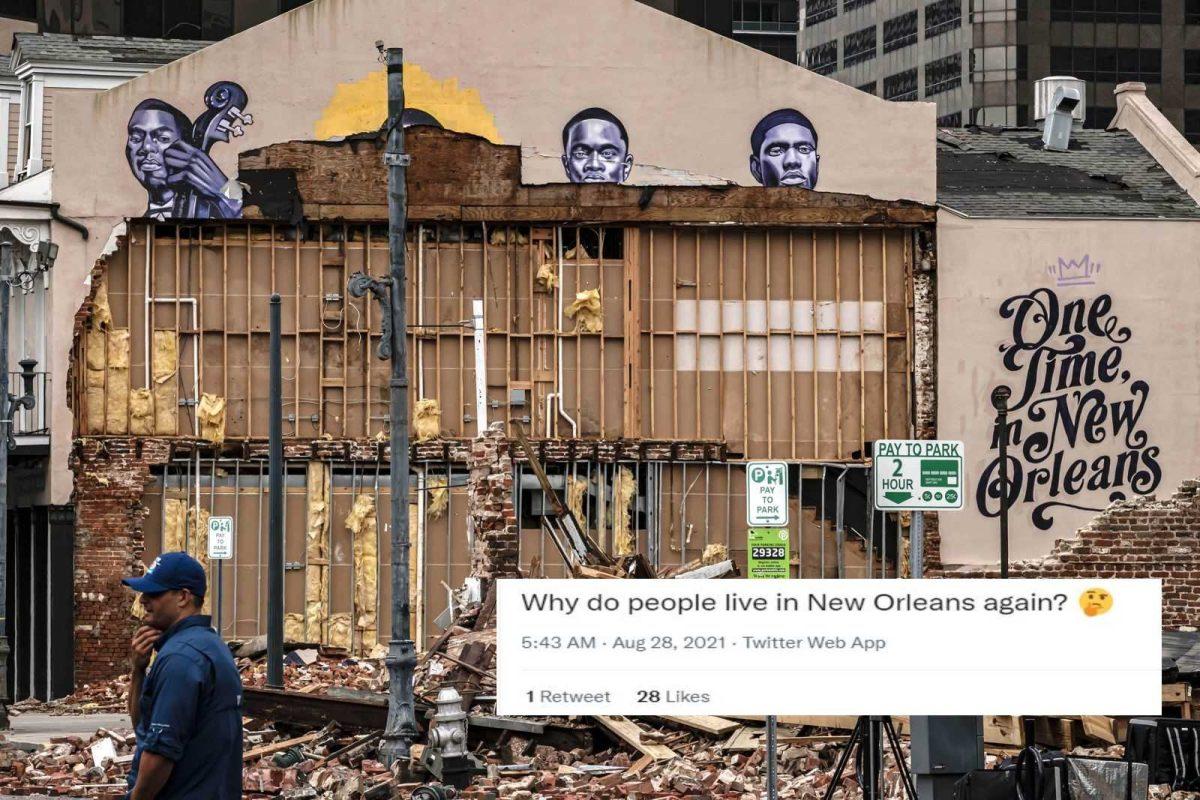Do you know what it means to miss New Orleans?
It is a phrase so ubiquitous in the city that I, a proud native, spent my childhood wondering who this Ms. New Orleans was and why everyone cared about what she thought.
I have hopefully progressed since then.
The famous, albeit painfully overused, local saying—taken from the title of a classic 1947 Louis Armstrong and Billie Holiday duet—is a question many southern Louisianans, not just those from New Orleans, might inevitably have to grapple with in the aftermath of Hurricane Ida.
A swarm of self-assured Twitter users certainly thought they should.
In the days immediately following Ida’s landfall, social media was bombarded with angry posts from around the country, irritably inquiring why people would willingly live somewhere under constant threat by natural disasters.
I initially dismissed all of this as arrogant and obnoxious cyberspace chatter, which, to some extent, it absolutely was. Only in the cold, brutal recesses of social media comment sections do you see something as absurd as people pontificating on the suitability of where others choose to live their lives, especially while said others are in dire need of empathy and assistance.
However, insensitivity aside, the question posed at the core of these rowdy comments seems to be a valid one, particularly from the perspective of those without substantive ties to the region.
With a notorious history of catastrophic hurricanes behind us and what is predicted to be an increase in these storms on the horizon, why would anyone willingly stay here?
As the famous quip, attributed to an array of figures ranging from Mark Twain and Tennessee Williams, goes, “There are three great cities in the U.S.: New York, San Francisco and New Orleans. Everywhere else is Cleveland.”
Apologies to any offended Clevelanders out there. I admittedly cannot speak on the insufferable nature of your city firsthand, but I must simply trust tradition to prove my point.
There is no other place on earth like southern Louisiana, full stop.
Of course, I appreciate that almost anyone from anywhere is eager to say the same for their own hometowns and that I cannot help but be a tad biased when writing about my own.
However, southern Louisiana is objectively among the most significant cultural and historical treasure troves in the world.
Not only would these cultural gems be difficult to leave behind, they need communities to embody them, nurturing these traditions for future generations.
In the post-Katrina New York Times op-ed “Do You Know What It Means to Lose New Orleans” (I told you the saying was overused), Anne Rice similarly argues on behalf of Louisiana natives in two ways.
First, as previously mentioned, the state bears an incomparable cultural legacy which must be protected and proliferated at all costs.
Her second point is even more vital. She correctly notes that the region is brimming with especially tight-knit communities, everyone interconnected through history and culture. Cousins, aunts and uncles, maybe even family friends, are closer than siblings are elsewhere…like Cleveland. Roots run deep and thick here.
While others may be more willing, even eager, to leave their native city or state behind and never look back, that is almost never how things work in southern Louisiana. Even those who do end up moving away tend to take a significant piece of home with them, never fully assimilating. They become Louisianans abroad.
It seems to me that this uniquely Louisianan appreciation for home explains the disconnect between locals and the judgmental Twitter swarm. They have trouble understanding why we choose to persevere through the storm threats because they may not know what it is like to call a place like this home.
Evan Leonhard is a 20-year-old English and philosophy junior from New Orleans.
Opinion: Stop telling Louisianans to move away from hurricane threat
September 14, 2021
The historic Karnofsky shop, where Louis Armstrong once worked, lies in ruins in New Orleans’ Central Business District on August 30.





